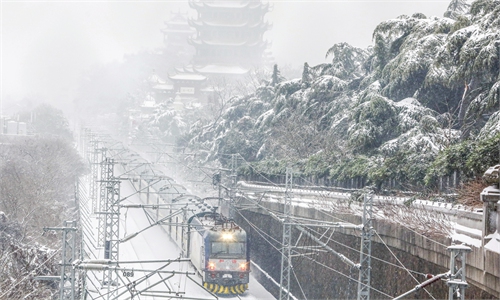Multiple places to suffer from strongest extreme weather conditions
China issues six alerts in one day; school, public transport suspended

Photo: Chen Tao/GT
Blizzard, freezing rain and strong winds have swept through a vast area of the central and eastern areas in China with multiple places expected to suffer from intense coldest spells and strongest extreme weather conditions this winter, as China's top meteorological authority continued to issue six extreme weather alerts simultaneously on Wednesday morning, and authorities in localities notified suspension of classes and public transportation, with reminders of corresponding measures. Meteorological expert warned of uncommon widespread freezing rain this year that can pose hazards to infrastructures and public transportation.China's National Meteorological Center (NMC) continued to issue an orange alert, the second highest level, for cold snap on Wednesday morning, forecasting accumulated drastic temperature drops up to 20 C in some parts of Southwest China's Guizhou Province, Central China's Hunan Province, South China's Guangxi Zhuang Autonomous Region and East China's Jiangxi Province from Wednesday through Friday morning. Daily average or lowest temperatures are expected to drop 6 C to 18 C in the majority of the southern areas in China.
Meanwhile, the NMC also issued yellow alerts for blizzard, fog and freezing rain, as well as blue alerts for strong winds and severe convection weather, affecting a vast area across the country.
The NMC forecast that the large-scale rainfall and snowstorm sweeping through the central and eastern regions will continue on Wednesday and enter the most severe period.
It is worth noting that a vast range of freezing rain or ice particles are expected to hit Central China's Hubei and Hunan provinces and East China's Anhui Province between February 20 and 25, affecting an area of 570,000 square kilometers. The most severe freezing rain was forecast to occur on Tuesday and Wednesday. It is expected that this freezing rain process will cause greater temperature drops, longer low temperature durations and wider range of influence, according to China Central Television (CCTV).
Ma Jun, director of the Beijing-based Institute of Public and Environmental Affairs, told the Global Times on Wednesday that freezing rain is a relatively uncommon weather phenomenon which poses greater hazards to infrastructures. It has occurred in Guizhou Province in the past but this year it has affected more regions.
According to the Ministry of Emergency Management, it has conducted joint consultations with China Meteorological Administration, the Ministry of Public Security, the Ministry of Transport and the National Energy Administration to deploy responding measures to low-temperature rain, snow and freezing weather conditions in 13 provinces. The authorities also dispatched a work group to Hunan to assist with disaster prevention and emergency response.
In Beijing, snowfall swept across the city on Tuesday evening, with a blizzard appearing in the southern part of the city. Approximately 63,000 sanitation workers joined in the clearing of the snow on the streets overnight, Jiemian News reported.
Affected by the snowfall, eight highways in Beijing were temporarily closed for snow and road icing. The citywide snowfall process ended Wednesday morning and all the affected roads resumed operation as of Wednesday noon. The Beijing Meteorological Service warned Wednesday afternoon that road icing is expected to remain until Thursday.
In Cangzhou, North China's Hebei Province, precipitation in the downtown reached 16.2 millimeters from Tuesday morning until the night, with the maximum precipitation recorded in Suning county, according to Jiemian News.
In Xuzhou, East China's Jiangsu Province, one of China's major transportation hubs, freezing rain started from afternoon until late night on Tuesday. Due to the humidity and low temperature of the freezing rain, ice of 1 to 2 centimeters thick appeared on the roads in the urban city, CCTV reported.
The local education authority in Xuzhou announced the suspension of classes at local kindergartens, primary schools and middle schools on Wednesday, according to CCTV.
Apart from Xuzhou, freezing rain affected road transportation in multiple places such as Northwest China's Shaanxi Province and Central China's Henan Province.
According to Ma, different from clearing snow on the roads, it is very difficult to clear the ice caused by freezing rain on the roads. Moreover, freezing rain also affects railways which will in turn affect the electricity system.
According to the Highway Monitoring & Response Center of China's Ministry of Transport, 190 road sections in 18 provinces were closed and 2,719 toll stations were closed as of Wednesday morning, Jiemian News reported.
Due to the double impact of snow and freezing rain, 360 toll station entrances in Shaanxi were temporarily closed or restricted in transportation.
Due to the impact of rain and snow, from Wednesday to Friday, China Railway Guangzhou Group suspended 56 railway trains which pass through areas such as Henan, Anhui, Hubei and Hunan.

